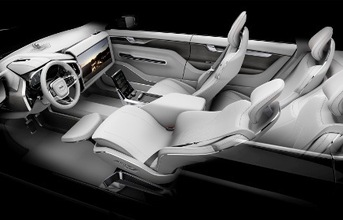
When the driver wishes to delegate driving to the car the steering wheel retracts, the seat reclines and a large display emerges from the dashboard allowing the driver to enjoy the time spent in the car as they like. Concept 26 embraces the need for radical change of the basic design of car interiors and provides a space that can be used as the driver/passenger wishes.
Concept 26 opens up a new paradigm of possibilities in the car - from entertainment to service provision and beyond, using the technology that is now a natural part of our everyday lives. It also signals the huge potential for new business opportunities and high-tech collaborations that autonomous drive will bring.
"We have gone to great lengths to understand the challenges and opportunities that autonomous cars will bring to people in coming years, and our flexible approach to engineering and design, enabled by our new Scalable Product Architecture, means that we can readily bring this from concept to reality," said Dr Peter Mertens, Senior Vice President Research and Development at Volvo Car Group.
Volvo Cars' ongoing Drive Me research project, which will see an extended fleet of fully autonomous cars driving real customers on the roads of Gothenburg, Sweden, in 2017 is further proof that Volvo is a leader in autonomous drive technology, building firmly on its foundation of safety.
"Volvo Cars is among the first to address the subject of self-driving cars and liability. We firmly believe that car makers should take full responsibility for the actions of the car when it is driving in full autonomous mode. If a manufacturer does not accept liability it clearly implies that they are not confident about their autonomous drive technology," said Dr Peter Mertens.
END


























